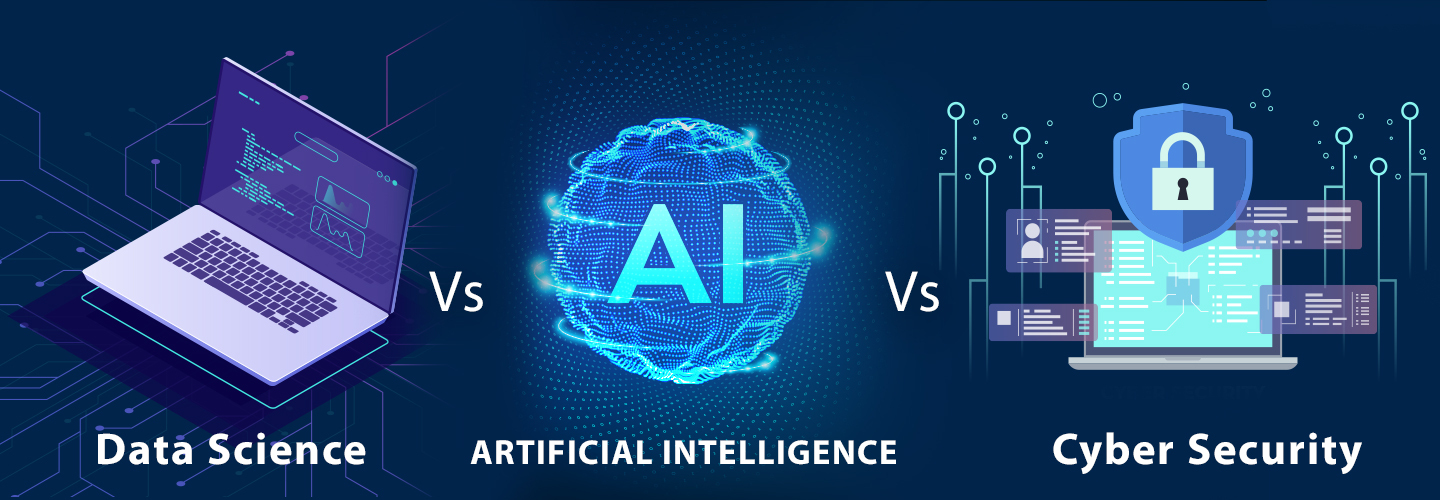The importance of remote operations and flexibility of the workplace is rapidly increasing in recent times in line with the countless advancements in technology. The whole world is busily upscaling and altering the existing technologies to fit the current developments and scenarios.
It could be quite challenging for a student who has just completed his Bachelors to choose the perfect course of study with ever-evolving technologies and options.
This can be your guide to find the perfect stream of study. The following are the basic questions you ask yourself before applying for admission to a University:
What is the fundamental difference between them?
- Data Science: Data Science is an amalgamation of usage of various algorithms, programs, procedures, and systems to interpret the patterns of large volumes of structured and unstructured data. Thereby, extracting meaningful comprehensions to base important business decisions.
- Cyber Security: Cyber Security is to secure computers, mobiles, other electronic devices, networks, and data from malicious attacks. It is usually called Information security and can be used in different fields like business, network security, application security, mobile computing, etc.
There are various types of cyber threats like cyber-crimes, cyber-attacks, and cyber terrorism which is performed through various malware (virus, Trojans, spyware, Dridex, adware, and botnets), SQL Injection, Phishing, denial-of-service attacks. - Artificial Intelligence:
Artificial Intelligence is to make a computer or a computer-controlled robot or software to adapt, learn and anticipate human behaviors and think intelligently like a human mind. This can be attained by studying human behavioral patterns and analyzing them using a cognitive approach. The end result will be smart technology, intelligent software, applications, and systems. The different types of AI are purely reactive, limited memory, theory of mind, and self-aware. AI can be applied in various areas such as online customer support, cybersecurity systems, banking fraud detection software, and virtual assistants.
1. What are my strengths?
Self-reflect on your strengths depending on your grades secured in each unit in Bachelors, lab scores, interests, passion, future goals, estimated salary, job prospects, likes, and dislikes. Compare the pros and cons for each field of study to arrive at the most desirable field of study for you. Make use of SWOT analysis to arrive at your Strengths, Weaknesses, possible Opportunities, and Threats for each interest field of study. Identify your stronger points such as Mathematics, statistics, probability, programming, networks, robots, machine learning, etc.
2. What is the right course for me?
Once you know what your strengths are it is a cakewalk to pick the perfect fit for you. Once you pick your path, ensure it is has a great scope in the future to meet your desired goals.
The four common foundation stones for an expert data scientist are business/domain knowledge, statistics, programming, and communication. If you think you are interested in all the above areas, you may go for this course.
If your interest lies in programming, python, algorithms, machine learning, Computing structures, or autonomous robots, you may go for artificial intelligence.
If your interest lies in defending various platforms from cyber-crimes, information security, cyberspace structures, and cryptography, you may choose cybersecurity.
3. What are the future job prospects and average pay-scales?
Salaries will be based on experience, location, skills and company.
Data Science: $113K per annum.
- Data Scientist
- Business Analyst
- Data Analyst
- MIS Reporting Executive
- Statistician
Cyber Security: $95,954 per annum
- Chief Information Security Officer
- Forensic Computer Analyst
- Information Security Analyst
- IT Security Engineer
- Penetration Tester
Artificial Intelligence: $114K per annum
- AI Data Analyst
- AI Engineer
- Machine Learning Engineer
- Business Intelligence Developer
- Big Data Engineer
4. How to choose the best country or University for your desired goal?
- Understand the local market for your specific field and course.
- Research on the strengths of the country and job opportunities in the specific field to become employable after the completion of the course.
- Choose the country depending on various factors like location, quality of education, market, future opportunities from the current trend, an average expected salary for your field, travel, favorite football team, etc.
- Next, choose the University depending on its world ranking (The Times Higher Education rankings and QS World University Rankings), country ranking, TEF (Teacher Excellence Framework) for teaching quality in that University, REF (Research Excellence Framework) for PHD or research courses, location, infrastructure, student support, placements, scholarships, travel, etc.
Some of the best Universities in the world to study DS:
- Imperial College London, U. K.
- The University of Texas at Austin, U. S. A.
- University of Warwick, U. K.
- University of Melbourne, Australia.
- University of Southern California (USC), U. S. A.
- University of Edinburgh, U. K.
Some of the best Universities in the world to study CS:
- University of Birmingham, U. K.
- University of Adelaide, Australia.
- Swinburne University, Australia.
- The University of Technology, Sydney, Australia.
- George Mason University, U. K.
- University of Essex, U. K.
Some of the best Universities in the world to study AI:
- University of Cinncinati, U. S. A.
- RMIT University, Australia.
- Deakin University, Australia.
- Oregon State University, U. S. A.
- University of Surrey, U. K.
- University of Stirling, U. K.
 EdMIUM
EdMIUM